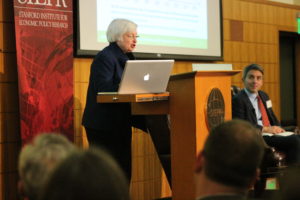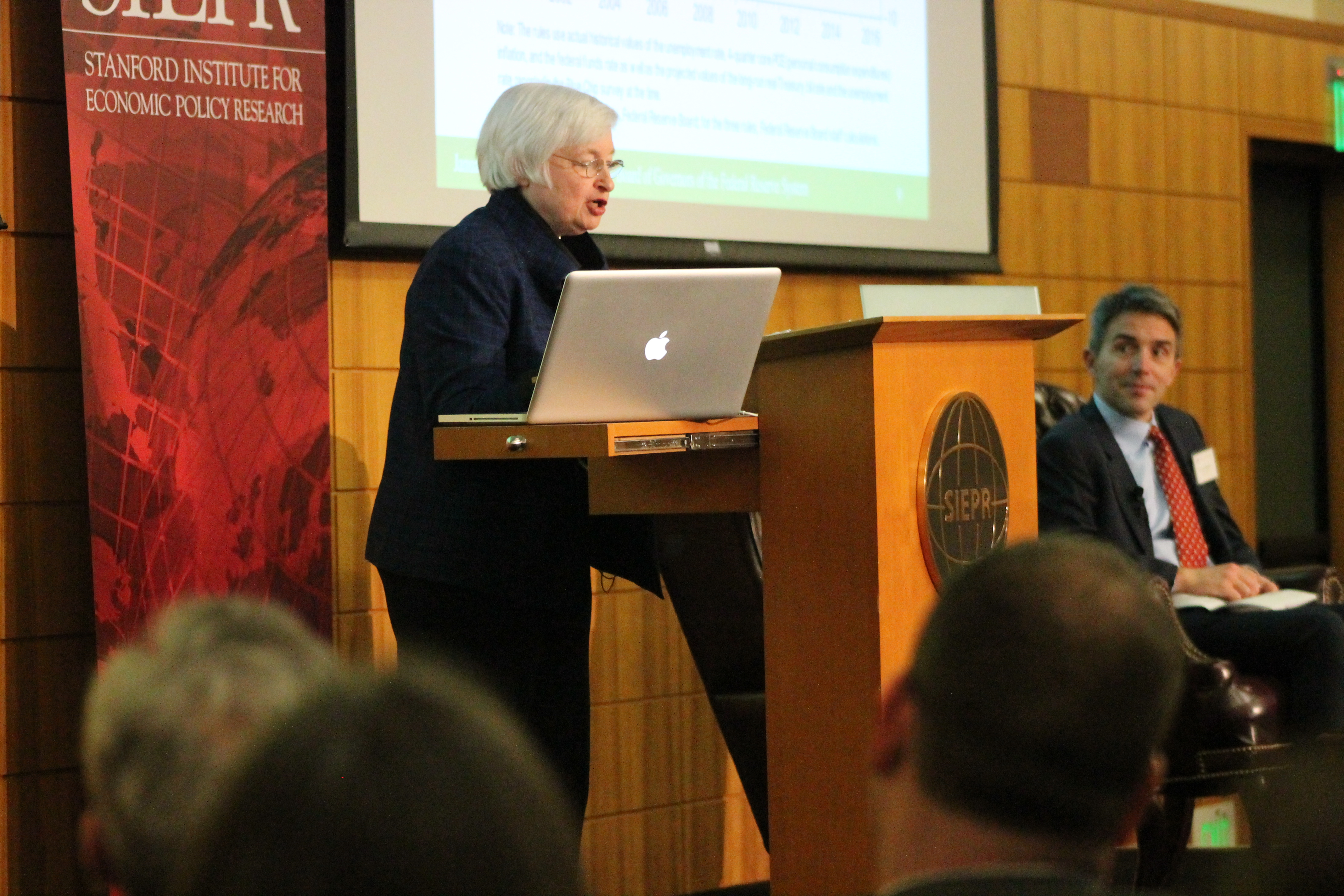
Federal Reserve Board Chair Janet Yellen came to the Stanford Institute of Economic Policy Research (SIEPR) on Thursday to hold a discussion on the economic outlook and conduct of monetary policy. Yellen’s remarks focused on the Fed’s work on stabilizing the United States economy following the 2008 recession.
Yellen noted that the Fed has come close to achieving its goal of maximum employment and price stability. The Fed estimates that employment is at its longer-run normal rate, with nearly 150,000 jobs being added into the market per month since the Great Recession.
Yellen went on to mention that it would be difficult to maintain these figures, even if the economy manages to avoid being hit with adverse shocks over the next few years.
“In order to sustain a strong job market with inflation at our two percent objective, policy must gradually shift toward a neutral stance, where ‘neutral’ is defined as a level of the federal fund’s rate that is neither expansionary nor contractionary when the economy is operating near its potential.”
Simple policy rules, Yellen emphasized, can serve as useful points to assess how monetary policy should be adjusted. She commented that researchers lack consensus in determining the cause for the slowdown in productivity growth. Further, the potential for changes in fiscal policy can also affect the economic output.
“The course of monetary policy over the next few years will depend on many different factors, of which fiscal policy is just one,” Yellen explained.
One question from the audience questioned balancing the Fed’s work with rules put forth by Congress about the Fed’s regulation, to which Yellen spoke about Congress seeking to understand the logic adopted by the Fed.
“I think we ought to be able to explain what we are doing and I think we have made strides in offering such projections,” Yellen said.
Yellen made clear her opposition to the House’s recently passed Federal Reserve Transparency Act of 2015, which requires the Fed to be audited and believes that it interferes with monetary policy. She reaffirmed her commitment to the Fed’s autonomy but also noted simultaneously that the Fed does owe the public explanations for its actions.
When asked about the importance of big data in impacting the Fed’s work, Yellen mentioned that the Fed does rely heavily on statistical agencies like the Bureau of Labour Statistics, the Bureau of Economic Analysis and the U.S. Census Bureau for economic modeling. Big data has not transformed everything the Fed does, but it is beginning to play a larger role.
The discussion also moved to Yellen’s thoughts on the impact of the aging population of U.S. on the economy. According to Yellen, the aging population is driving labor force participation down from its peak of 67 percent at the turn of the millennium to around 62 percent currently, which is expected to decline further. The aging population is pushing down the rate of sustainable growth in economy. Her colleagues believe that the longer-run normal rate is just below two percent because of it. The shift in demographics will also result in health care expansion, leading to major fiscal support changes. With unchanged tax and spending policies, there could be unsustainable deficits because of a larger share of GDP devoted towards Medicare, Medicaid and Social Security.
Trione Director of SIEPR Mark Duggan spoke to The Daily about the significance of Yellen’s visit.
“I think that there are a number of people in the U.S. and around the world who can move the levers of policy in various ways,” Duggan said. “The Federal Reserve has many levers that can affect price level and economic activity … I think what’s neat about having someone like Janet Yellen come is that it’s an opportunity for faculty and students and SIEPR supporters to hear from someone how they think about a very complicated world. We can talk about things on an abstract, theoretical level in class, but there’s no real substitute for having someone who’s actually out there.”
In addition to Yellen’s talk, SIEPR has plans to host other influential economic policy influencers in the future. According to Duggan, SIEPR will host the former Deputy Secretary of the Treasury Sarah Bloom and President of the Kansas City Federal Reserve Esther George. The organization is also planning an economic summit where Larry Summers and other speakers will present their work and ideas.
Contact Vibhav Mariwala at vibhavm ‘at’ stanford.edu.
